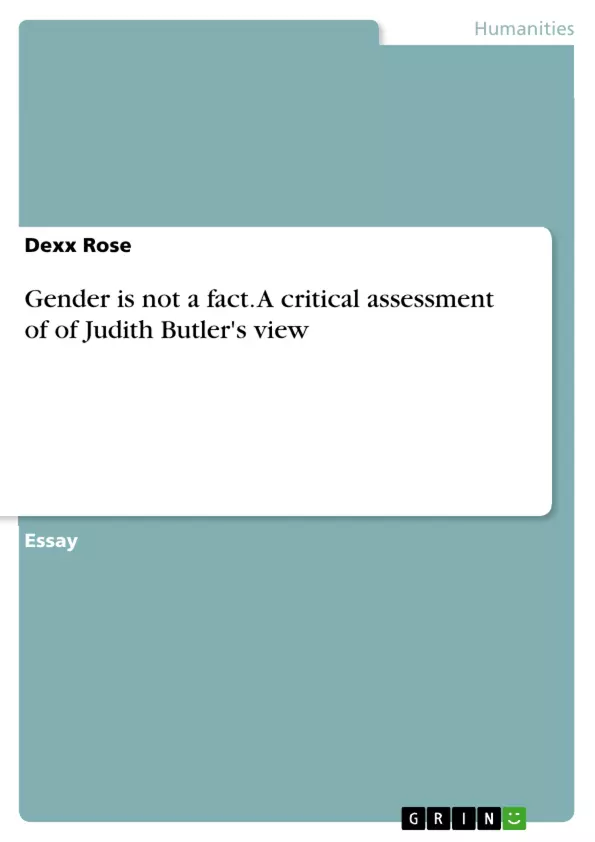A critical assessment of the view of Judith Butler that gender is not a fact, using the relevant examples, including documentaries and other academic sources.
The politics of gender continues to facilitate complex discourse of why, when and how gender is constructed and has attracted a plethora of theories. With third wave feminism being more inclusive of gender diversity the idea of gender as a social construct became a popular argument, as explored by Judith Butler in her book 'Gender Trouble.
Butler looks at a new way of approaching sex and gender construct, as opposed to the traditional heterosexualized notion of masculinity and femininity. Like many other scholars, theorists and feminists such as Michel Foucault, Audre Lorde and Adrienne Rich, Butler presents the argument that gender should be seen as fluid and adapt to our behavior and mannerisms at different times and in different situations rather than a rigid definition of who we are as gendered beings.
Butler's entire argument of gender is centered on the idea of deconstructing the historical definition of gender, so as to move toward a more inclusive and equal society; one where we are not limited to feminine and masculine constructs. While many argue that gender is a biological, biosocial construct that is influenced by nature, work by Butler and other theorists, as well as the lived experiences of different human beings from various cultures, support the idea that gender is indeed not a fact but rather a socially constructed theory.
Inhaltsverzeichnis (Table of Contents)
- A Critical assessment of the view of Judith Butler that gender is not a fact.
- Gender as Performative
- Gender Identity and Expression
- The Politics of Gender
- The Biological Construct of Gender
- Transgenderism
- Intersexuality
- The Definition of Woman
Zielsetzung und Themenschwerpunkte (Objectives and Key Themes)
This text critically examines Judith Butler's argument that gender is not a fact but rather a social construct. It explores the implications of this perspective for understanding gender identity, expression, and the lived experiences of transgender and intersex individuals.
- The concept of gender as a performative act
- The role of culture and society in shaping gender identities
- The challenges faced by transgender individuals in various societies
- The limitations of the biological construct of gender
- The impact of gender constructs on the lives of intersex individuals
Zusammenfassung der Kapitel (Chapter Summaries)
- The text begins by introducing Judith Butler's theory of gender as a social construct and how this challenges traditional views of gender as a fixed biological fact. Butler argues that gender is not determined by our biology but is rather constructed through our actions and interactions.
- The text then explores the concept of gender as performative, highlighting Butler's view that gender is "real only to the extent that it is performed." This chapter analyzes how our gendered attitudes and behaviors are constantly being shaped and reshaped through our interactions with the world.
- This chapter examines the lived experiences of transgender individuals across various cultures, demonstrating how their gender identities and expressions often conflict with societal norms and expectations. The chapter highlights the challenges and discrimination faced by transgender individuals, including violence, rejection, and social isolation.
- The text critiques the biological construct of gender, which posits that gender is determined by our biological sex. It argues that this theory fails to account for the fluidity and diversity of gender identities and expressions. This chapter also explores the history of the biological construct of gender and its connection to traditional gender roles.
- The text delves into the concept of intersexuality and how it challenges the notion of gender as a binary. The chapter examines the medicalization of intersex bodies and the process of assigning gender to infants with ambiguous genitalia. It explores the ethical implications of assigning gender to infants who may not identify with that gender later in life.
Schlüsselwörter (Keywords)
This text explores key concepts related to gender studies, including gender as a social construct, gender performance, transgenderism, intersexuality, and the limitations of the biological construct of gender. It draws on the work of prominent theorists such as Judith Butler, Michel Foucault, Susan Stryker, and Simone de Beauvoir, and examines real-life stories of individuals whose experiences challenge traditional notions of gender.
Frequently Asked Questions
What does Judith Butler mean by "Gender is performative"?
Butler argues that gender is not a fixed identity but something created through the repetition of acts and behaviors shaped by societal norms.
How does Butler distinguish between sex and gender?
She challenges the traditional binary, suggesting that both are socially constructed rather than rigid biological facts.
What is the significance of the book "Gender Trouble"?
It is a foundational text in queer theory that deconstructs historical definitions of gender to promote a more inclusive society.
How does intersexuality challenge the gender binary?
The existence of intersex bodies shows that biological sex is not always a simple male/female binary, complicating societal gender assignments.
What are the political implications of Butler's view?
By seeing gender as fluid, society can move toward greater equality where individuals are not limited by masculine or feminine constructs.
- Arbeit zitieren
- Dexx Rose (Autor:in), 2015, Gender is not a fact. A critical assessment of of Judith Butler's view, München, GRIN Verlag, https://www.hausarbeiten.de/document/350645


